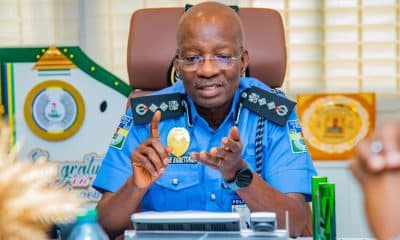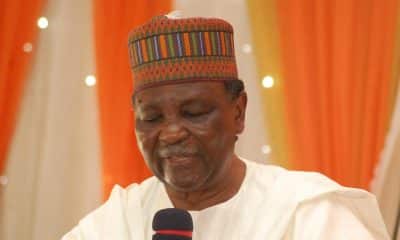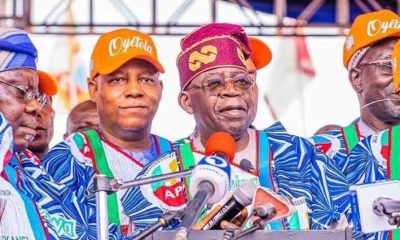Nigeria News
Judges, Retired Justices Question Nominations Of 22 Justices For Supreme Court

Some senior serving judges and retired justices have questioned the nomination of twenty-two justices for Supreme Court appointment.
Naija News recalls that the list was released by the Federal Judicial Service Commission (FJSC), last Thursday.
A senior Justice who spoke with Vanguard on the list said that President Bola Tinubu may be heading towards direct confrontation with a wider section of senior members of the Nigerian bench.
He said, “never in the history of Nigeria has appointment of Supreme Court justices been this politicized.”
Another Justice said the case of North-Central zone where the son of a former Chief Justice of Nigeria (CJN) was slated as a priority while a senior jurist with over 15 years experience in the Court of Appeal, is placed as reserve, is controversial.
The Justice added that the strangest of the ongoing process is that “the South-South slot where the person adjudged as the very best is curiously pencilled as reserve.”
Sources that spoke with the platform noted that during the processing phase, the Justice placed as priority was not short-listed among the four that were sent to the FJSC.
The source asked, “The question many in the Judicial circle are asking is: how did someone who did not make the short-list suddenly emerge as priority over and above the person adjudged to be the best.”
The source disclosed that for the South-South, the Justice placed as reserve now was the priority candidate in 2019 but was dropped then because he was considered to be too young at 53.
He added, “How did he suddenly drop four years after when he has been rated so highly? Anyone who wants to check the quality of the Justices can go to the Law Pavilion, which is the electronic law report and see which Justice of the Court Appeal has the highest ratio. The person placed as reserve has the highest ratio.”
In the North-West, some Justices wondered how Justice AB Gumel was dropped from the list “despite being the number one on the list of jurists from his zone.”
In the South-West, the source said a justice who was a reserve candidate in 2019 is still on the reserve list while a justice who had never made the short-list was placed as priority.
If not urgently addressed, some senior members of the Nigerian Judiciary feared that the low morale and rancour in the Judiciary would worsen.
A renowned academic and a respected member of the inner bar, Prof Yemi Akinseye George (SAN), however, applauded the FJSC’s list.
He said it is though possible for human error to have filtered into the list, he nonetheless said he could score the list 99.9%
Akinseye said, “When I saw the list of those justices, I felt very proud. I have appeared before many of those justices and I have worked with many of those justices at different committee levels, you know. So, they are excellent names. Most of those names are excellent names. It is possible that one or two may have entered the list, but I dont know, but from what I can see and my interaction with those names, they are excellent justices of the appellate court who merit being in the Supreme Court.”
He also said he was comfortable that no candidate from both legal practice and academia made the list, saying any legal practitioner who wants to become a justice of the Supreme Court should start from the high court.
He said Justice Niki Tobi who was a Professor of Law from the academia did not start at the Supreme Court and that he did very well.
He also said many legal practitioners nowadays are party goers with a lot of friends and clients everywhere with love for money, qualities he claimed are antithetical to what should be found in a judge.
Law professor, Sam Erugo, SAN in his reaction to the list of nominess, said: “Personally, I am not surprised at the decision by FJSC to consider only the Court of Appeal Justices for nomination to fill the vacant slots at the Supreme Court. We must appreciate that the judiciary is a conservative institution. Change from the usual practice is difficult. I don’t believe the campaign for change has been rigorous and persuasive enough to achieve the desirable social change.
“Again, the bench is more organized for the contestation-the Justices can easily be assessed by the number and particularly the quality of recent judgments delivered. The Justices are already in the bench; it is only natural that hard-working Justices of the Court of Appeal would be elevated to the Supreme Court as a reward for hard work.
“In the current scheme of things, the Bar is not strong enough to insist on any slot in appointment to the apex court. The procedure for such an appointment is not settled, and it may cause more division in the judiciary. At the least, there must be criteria to assess the competence of a practising lawyer or academic as a candidate for direct appointment to the Supreme Court. We do not have such set criteria yet, and the urgency of the present appointment will not permit the rigours of usual committees to set standards.”
Sources at both the Office of the Chief Justice of Nigeria and the National Judicial Council (NJC) told Vanguard on Sunday that there was nothing to worry about regarding the purported complaints of the senior serving and retired justices.
According to the source in the Office of the CJN who preferred anonymity, “the appointment of justices into the Supreme Court is a process.
“While I am not lending any credence to the allegations contained in your question, Paragraph 13 of Part I of the Third Schedule to the 1999 Constitution provides that the Federal Judicial Service Commission (FJSC) shall have powers to advise the National Judicial Council (NJC) in nominating persons for appointment to the office of the CJN, Justice of the Supreme Court, President of the Court of Appeal, Justice of the Court of Appeal, the Chief Judge of the Federal high Court, a Judge of the Federal High Court and the Chairman and members of the Code of Conduct Tribunal, the provision never said the advice shall be mandatorily upheld by the NJC.
“Having said that, the Commission considers a lot of factors in shortlisting candidates including years of service on the bench and the integrity of individual candidates.
“To properly understand my point, consider this scenario: a person may be on the priority list in 2019 as you said, perhaps based on the factor of seniority on the bench, it may be dropped for a better candidate in 2023.
“This is because four years is a long period of time and it is possible that between 2019 and 2023, a lot of things might have happened. A judge who has unblemished record in 2019 might have had his record soiled one way or the other years after.
“Get me right. I never said that was what happened in the cases you cited but I was only trying to tell you that there could be explanations to the cases you cited.”
Another impeccable source from the NJC who preferred anonymity reiterated to Vanguard that the list was not final.
“Dont forget, only 11 vacancies were declared by the Chief Justice of Nigeria at the Supreme Court. But the FJSC sent 22 names. The NJC cannot send the same list to the President for the assent of the Senate before the appointment is approved.
“That there were two lists—priority and reserved—shows that the NJC has a job to do.
“I can therefore confirm to you that the practice at the NJC is that all the 22 candidates will be subjected to rigorous interview session while the best 11 amongst them would be picked.
“Sometimes, in exceptional cases, candidates who didnt make the two lists—priority and reserve—may still make the Supreme Court.
“I can categorically confirm to you that there had been few occasions in the past when the NJC replaced names on the priority list by picking from the reserved list after such candidates were interviewed.
“NJC is not under compulsion to adopt the FJSC’s priority list.
“It is a work in progress. I can assure that the best candidates for the job will be forwarded to the President.”












